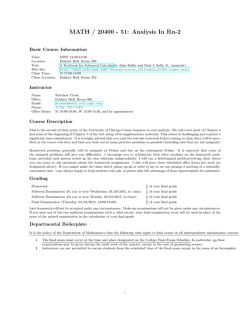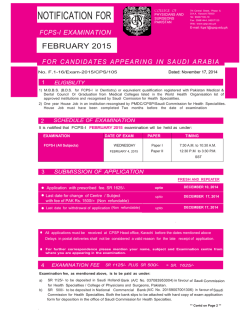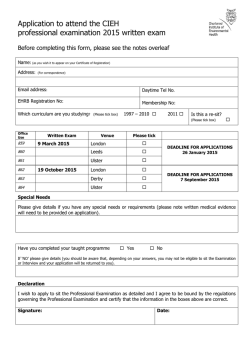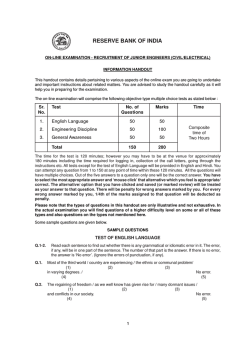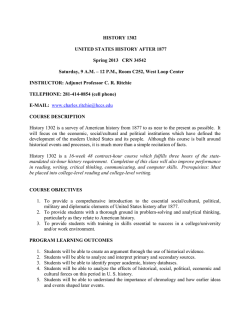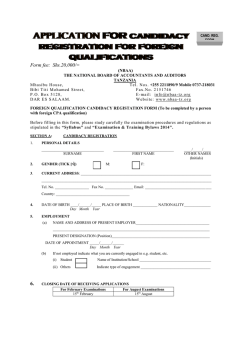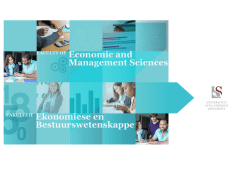
RACC-CFRA Handbook - Professional Testing Corporation
CERTIFICATION EXAMINATION FOR FINANCIAL RESEARCH ADMINISTRATORS Handbook for Candidates EXAMINATION DATES Fall 2014 Application Deadline July 31, 2014 Testing Window Begins: September 13, 2014 Ends: September 27, 2014 Spring 2015 Application Deadline January 31, 2015 Testing Window Begins: March 14, 2015 Ends: March 28, 2015 Fall 2015 Application Deadline July 31, 2015 Testing Window Begins: September 12, 2015 Ends: September 26, 2015 1350 BROADWAY 17th FLOOR NEW YORK, NY 10018 (212) 356-0660 WWW.PTCNY.COM PLEASE NOTE RACC is going to include questions referencing the Uniform Guidance into the examinations on a slight delay and over a period of time/phases. This decision was based on the fact that one of our eligibility requirements is that a research administrator needs to have at least three years of experience in the profession, so we are essentially testing information which should have been acquired from working during the last three years. Additionally, many of the changes to the annual audit requirements do not take place immediately and are implemented over time. RACC has decided to phase the new regulations into our examinations gradually, so that by the end of three years the examinations will be totally based on the new Uniform Guidance and the resulting agency positions in the management of their awards. We believe that this phased approach will also mirror how research administrators will be implementing the regulations in daily decisions and in our roles. The schedule is as follows: May and November 2015 – former regulations (Circular based and using agency specific regulations predating the December 26, 2014 implementation date) May and November 2016 – approximately 1/3 of the relevant questions will be based on the new regulations May and November 2017 – approximately 2/3 of the relevant questions will be based on the new regulations May 2018 examination – All relevant questions will be based on the new regulations TABLE OF CONTENTS CERTIFICATION......................................................................................... - 1 REASONS FOR CERTIFICATION ................................................................- 1 ELIGIBILITY REQUIREMENTS..................................................................... - 1 ADMINISTRATION....................................................................................- 2 ATTAINMENT OF CERTIFICATION ............................................................ - 2 CODE OF ETHICS....................................................................................... - 2 REVOCATION OF CERTIFICATION ............................................................. - 3 APPLICATION PROCEDURE.......................................................................- 3 COMPLETION OF APPLICATION................................................................- 3 FEES ......................................................................................................... - 3 REFUNDS/TRANSFERS............................................................................. - 4 EXAMINATION ADMINISTRATION ........................................................... - 4 TESTING SOFTWARE TUTORIAL............................................................... - 4 SCHEDULING YOUR EXAMINATION APPOINTMENT ................................- 4 CHANGING YOUR EXAMINATION APPOINTMENT................................... - 5 SPECIAL NEEDS........................................................................................ - 5 CANDIDATES OUTSIDE THE UNITED STATES AND PARTS OF CANADA.. - 5 RULES FOR THE EXAMINATION ............................................................... - 5 REPORT OF RESULTS................................................................................ - 6 REEXAMINATION...................................................................................... - 6 CONFIDENTIALITY..................................................................................... - 6 CONTENT OF EXAMINATION.................................................................... - 6 CONTENT OUTLINE................................................................................... - 7 SAMPLE EXAMINATION QUESTIONS..................................................... - 11 REFERENCES .......................................................................................... - 12 NOTES .................................................................................................... - 14 - This handbook contains necessary information about the Certification Examination for Financial Research Administrators (CFRA). Please retain it for future reference. Candidates are responsible for reading these instructions carefully. This handbook is subject to change. -1- CERTIFICATION The Research Administrators Certification Council (RACC) promotes the concept of voluntary certification by examination for all financial research and sponsored programs administrators. After passing this examination, an individual earns the Certified Financial Research Administrator (CFRA) designation. Certification is just one part of a process called “credentialing”. It focuses specifically on the individual and is one indication of current competence in this specialized field. Certification in financial research and sponsored programs administration is highly valued and provides formal recognition of basic knowledge in this field. REASONS FOR CERTIFICATION 1. To provide documented evidence to a current or potential employer that an individual has been examined by an independent professional certifying organization and found to possess a certain level of basic knowledge of financial research and sponsored programs administration. 2. To provide personal and professional satisfaction of achievement of meeting established criteria indicating the attainment of a level of basic knowledge that is customary to be a professional in the field of financial research and sponsored programs administration. 3. To demonstrate commitment to the profession and to one's peers that an individual has taken the time and effort, beyond job experience, to learn the Financial Body of Knowledge, thus exhibiting a significant responsibility to working in the profession of financial research or sponsored programs administration. ELIGIBILITY REQUIREMENTS 1. A Master’s degree or Bachelor's degree and three (3) years of professional experience in financial research administration or sponsored programs administration. OR 2. An Associate’s degree and six (6) years of professional experience in financial research administration or sponsored programs administration.* OR 3. Eight (8) years of substantial experience in the financial research administration or sponsored programs administration.* *Petitions for approval of this option are available on the RACC homepage, http://www.racc-cert.org/whatiscertification.html -2 - ADMINISTRATION The Certification Program is administered by the Research Administrators Certification Council (RACC). The Certification Examination for Financial Research Administrators is conducted by the Professional Testing Corporation (PTC), 1350 Broadway - 17th Floor, New York, New York 10018, (212) 3560660, http://www.ptcny.com. The Professional Testing Corporation is an organization whose services are focused on the measurement aspects of human resources, including the design, development, and administration of tests and testing programs for professional organizations. Questions concerning the examination should be referred to PTC. ATTAINMENT OF CERTIFICATION Eligible candidates who pass the examination will be certified for a period of five years, are eligible to use the designation CFRA after their names, and will receive a certificate from the RACC. A registry of Certified Financial Research Administrators is maintained by the RACC and may be reported in its publications. Further information concerning the CFRA credentialing program and information regarding preparation for the examination may be found at the RACC homepage, http://www.racc-cert.org. Annotated lists of the content outline for the CFRA examination and RACC’s Body of Knowledge may be found at http://www.racc-cert.org. The CFRA designation is awarded for a period of five (5) years at which time a CFRA must recertify for an additional five (5) years by one of two methods: 1. Earning 80 contact hours of education credits during the preceding 5 years, 80% of which (64 credits) must be taken in topics related specifically to financial activities 2. Re-taking and passing the CFRA examination Reminders about recertification will be sent by way of email, beginning six (6) months before the dates of recertification. CODE OF ETHICS Certificants are expected to practice and uphold the following principles in the discharge of their professional responsibilities. A candidate is required to sign the following statement as part of their application process: I agree that I shall: perform my duties with honesty, diligence, and responsibility conduct myself free of personal and professional conflicts or the appearance of impropriety remain mindful as a steward of the funds I assist in requesting and managing have been provided fundamentally for the public good be prudent in the use and protection of sensitive information/data act in good faith promoting ethical integrity in all of our actions in public forums, maintain respectful communication about others in the profession -3- REVOCATION OF CERTIFICATION Certification may be revoked by the RACC for any of the following reasons: 1. Falsification of an Application. 2. Misrepresentation of certification status. 3. Breach of existing ethical standards of professional practice. An appeals mechanism for challenging revocation of Certification is available. APPLICATION PROCEDURE 1. Read and follow the directions on the application and in this handbook. All applications must be completed online. The application can be found on Professional Testing Corporation’s website https://secure.ptcny.com/apply/. 2. The online application and appropriate fees for the examination must be received on or before the appropriate deadline listed in this handbook. COMPLETION OF APPLICATION Candidates must complete the examination application in full, using your name exactly as it appears on your current government issued photo ID such as your driver’s license or passport. The completed application, with all documentation (if required), must be submitted online with the examination fee. If payment is being made by check or money order, complete the online application and mail payment to: RACC EXAMINATION Professional Testing Corporation 1350 Broadway, 17th Floor New York, NY 10018 NOTE: Be certain payment clearly indicates candidate name and appropriate examination and testing period. FEES Application Fee for the Certification Examination for Financial Research Administrators ....................................................................................$375.00 Special Test Center Fee .....................................................................$100.00 MAKE CHECK OR MONEY ORDER PAYABLE TO: PROFESSIONAL TESTING CORPORATION Visa, MasterCard, and American Express are also accepted. Please complete and sign the credit card payment form on the Application. DO NOT SEND CASH. -4 - REFUNDS/TRANSFERS There will be no refund of fees. A candidate who applies to take the examination but then wishes to take it during a different testing period may be granted a one-time deferment to the immediate next testing period if the candidate requests the deferment in writing and submits the transfer fee of $210 to Professional Testing Corporation. Only one deferment will be permitted. The candidate is responsible for contacting PSI at (800)733-9267 and canceling the examination appointment, if one has been made. EXAMINATION ADMINISTRATION The Certification Examination for Financial Research Administrators is administered during an established two-week testing period on a daily basis, Monday through Saturday, excluding holidays, at computer-based testing facilities managed by PSI. PSI has several hundred testing sites in the United States, as well as Canada. Scheduling is done on a first-come, first-serve basis. To find a testing center near you visit: www.ptcny.com/cbt/sites.htm or call PSI at (800) 733-9267. Please note: Hours and days of availability vary at different centers. You will not be able to schedule your examination appointment until you have received an Eligibility Notice from PTC. TESTING SOFTWARE TUTORIAL A Testing Software Tutorial can be viewed online. Go to http://candidate.psiexams.com/tutorial.jsp. This online Testing Software Tutorial can give you an idea about the features of the testing software. SCHEDULING YOUR EXAMINATION APPOINTMENT Once your Application has been received and processed and your eligibility verified, you will be sent a postcard from PTC confirming receipt. Within six weeks prior to the first day of the testing window, you will be sent an Eligibility Notice by email from [email protected]. Please add the ‘ptcny.com’ domain to your email spam filter safe list. A paper copy of your Eligibility Notice plus current government-issued photo identification must be presented in order to gain admission to the testing center. Electronic copies of the Eligibility Notice are not acceptable. You must have a printed copy of your Eligibility Notice to gain admission to the testing center. If you do not receive an Eligibility Notice or other correspondence at least three weeks before the beginning of the testing period, contact the Professional Testing Corporation at (212) 356-0660. The Eligibility Notice will indicate where to call to schedule your examination appointment as well as the dates during which testing is available. Appointment times are first-come, first-serve, so schedule your appointment as soon as you receive your Eligibility Notice in order to maximize your chance of testing at your preferred location and on your preferred date. After you make your test appointment, PSI will send you a confirmation email with the date, time and location of your examination. Please check this confirmation carefully for the correct date, time and location. Contact PSI at (800) 733-9267 if you do not receive this email confirmation or if there is a mistake with your appointment. -5- It is your responsibility as the candidate to call PSI to schedule the examination appointment. It is highly recommended that you become familiar with the testing site. Arrival at the testing site at the appointed time is the responsibility of the candidate. Please plan for weather, traffic, parking, and any security requirements that are specific to the testing location. Late arrival may prevent you from testing. CHANGING YOUR EXAMINATION APPOINTMENT If you need to cancel your examination appointment or reschedule to a different date within the two-week testing period, you must contact PSI at (800) 733-9267 no later than noon, Eastern Standard Time, of the second business day PRIOR to your scheduled appointment. PSI does not have the authority to authorize refunds or transfers to another testing period. SPECIAL NEEDS Special testing arrangements will be made for individuals with special needs. Submit the Application, Examination Fee, and a completed and signed Request for Special Accommodations Form, available from www.ptcny.com or by calling PTC at (212) 356-0660. Requests for special testing for individuals with special needs must be received at least EIGHT weeks before the testing date. Please notify PTC at least two weeks prior to your examination appointment if you need to bring a service dog, medicine, food, or beverages necessary for a medical condition with you to the test center. CANDIDATES OUTSIDE THE UNITED STATES AND PARTS OF CANADA It may be possible to establish a special testing center to take a paper and pencil examination in your own country for an additional fee of $100.00. A Special Testing Center Request Form is available at www.ptcny.com and must be submitted along with payment to PTC upon submission of application EIGHT weeks before the testing period begins. The Special Testing Center Fee will be waived for groups of 5 or more testing at the same time and location. RULES FOR THE EXAMINATION 1. Electronic devices, including but not limited to, cell phones, pagers, laptop computers, tablets, Bluetooth type devices, MP3 players (i.e. iPod), cameras, and voice recorders cannot be operative during the examination. 2. Simple, nonprogrammable calculators are permitted with the exception of calculators as part of cellular phones, etc. A calculator is also available on screen if needed. 3. No questions concerning content of the examination may be asked during the examination session. The candidate should carefully read the directions that are provided on screen at the beginning of the examination session. -6 - 4. No papers, books or reference materials may be taken into or removed from the examination room. 5. Candidates are prohibited from leaving the testing room while their examination is in session, with the sole exception of going to the restroom. REPORT OF RESULTS Test results are not released at the testing center but will be sent via mail within four weeks following close of the testing period. This is necessary to allow for the psychometric review and administrative time required to ensure accurate and reliable scores. Scores on the major areas of the examination and on the total examination will be provided. Successful candidates will also receive certificates from RACC. REEXAMINATION The Certification Examination for Financial Research Administrators may be taken as often as desired upon filing of a new Application and payment of the applicable fee. There is no limit to the number of times the examination may be repeated. CONFIDENTIALITY 1. The RACC will release the individual test scores ONLY to the individual candidate. 2. Any questions concerning test results should be referred to RACC or the Professional Testing Corporation. CONTENT OF EXAMINATION 1. The Certification Examination for Financial Research Administrators is a computer-based examination composed of a maximum of 250 multiple choice, objective questions with a total testing time of four (4) hours. 2. The content for the examination is described in the Content Outline on page 7. 3. The questions for the examination are obtained from Certified Financial Research Administrators, individuals with expertise in financial research administration, and are reviewed for construction, accuracy, and appropriateness by the RACC and PTC’s psychometricians. 4. The RACC, with the advice and assistance of the Professional Testing Corporation, prepares the examination. 5. The Certification Examination for Financial Research Administrators will be weighted in approximately the following manner: I. Governing Framework .................................................................25% II. Project Costs ................................................................................35% III. Reporting ....................................................................................25% IV. Fiscal Compliance ........................................................................15% -7- CONTENT OUTLINE For an annotation giving sample resources, see http://www.racc-cert.org. The CFRA examination is based upon the federal regulations in existence prior to December 26, 2013. Examinations will be updated to reflect new regulations after December 26, 2014, this being the time frame for sponsoring agencies to implement the new regulations. I. Governing Framework A. Statutory Requirements 1. FOIA 2. Unrelated Business Income Tax (UBIT) 3. Non-delinquency on federal debt 4. IRS classification of institution 5. Salary cap 6. Other Regulations 1. Administrative Requirements (2 CFR Part 215) 2. Cost Principles (2 CFR Part 220) 3. Audit Guidelines (OMB Circular A-133) 4. Federal Acquisition Regulations (mandatory clauses for cost reimbursable contracts, clauses based on institution types) 5. Other Agency Policies 1. DHHS 2. NSF 3. DOD 4. Other Awards 1. Types and characteristics of sponsors a. Federal, state and local government b. Nonprofit c. For profit business and industry d. International Entity e. Sponsor Responsibilities 2. Forms of Federal Assistance (discretionary, mandatory, block, formula) 3. Specific Award Terms and Conditions 4. Budget flexibility and budget restrictions (cost reimbursable, fixed price, task order, deliverable-based) 5. Period of performance and pre-award costs 6. Incremental funding and limitation of costs 7. Other Institutional Policies and Procedures (policy development and implementation) B. C. D. E. -8 - II. Project Costs A. B. Types of funding Budget Structure 1. Role of the budget and characteristics of effective budgets 2. Budget models, templates and forms (Modular, Line item, SF424 form, Grants.gov) 3. Understanding sponsors’ budget guidelines 4. Types, definitions and uses of budget categories 5. Budget templates and forms 6. Calculations of budget costs a. Institutional base salaries b. Effort and calendar months c. Fringe benefits d. F&A costs e. Other 7. Budget justification 8. Major Functions of Institution A-21 9. Revised budgets and rebudget of costs 10. Other C. Composition of Costs 1. Total Project Costs 2. Direct Costs a. Salaries and wages (federal requirements for employee compensation on sponsored projects, institutional base salary, post-differential allowance for employees based abroad, percentage of effort/calendar months) b. Equipment (definition) c. Travel (per diem, FLY US,) d. Recharge or cost centers e. Other project-related costs 3. F&A Costs a. Development of F&A rate proposal (cognizant audit agency) b. Methods for developing F&A rate (simplified method, direct allocation, multiple allocation, F&A cost rate proposal method) c. Types of F&A costs (predetermined, provisional, fixed, final) d. Components of F&A costs (formula) e. F&A cost base types (MTDC, TDC, S&W) f. Waiver of F&A costs g. Major Project/Unlike Circumstances (criteria and application) 4. Fringe Benefit rates (calculation, composition) D. Allocation of Costs E. Budgets for specific funding programs 1. Clinical Trial Costing (per patient budgets & billing) 2. Training grant budgets (stipend levels, budget restrictions for trainee expenses) 3. Other F. Cost sharing (cash & in-kind contributions; criteria, types, documentation) G. Program Income H. Project expenses 1. Pre-award Costs 2. Noncancelable costs 3. Cost Overruns & Residuals 4. Disallowed expenses 5. Accelerated expenses 6. Other I. Expanded authorities -9- III. Reporting A. B. C. D. E. F. G. Institutional Award Reporting (reports on awards and expenditures, NSF/national rankings, benchmarking) Cost Recovery 1. Invoicing (deliverable based billing, scheduled payments, cost reimbursable, fixed price, billing practices) 2. Letter of Credit and other electronic methods for drawing down funds 3. Nonpayment 4. Payments Financial Reports 1. Reporting Periods 2. Federal Financial Reports (FFR) 3. Relinquishment Statement 4. Authorized Signatory & Certification Statement 5. Other Institutional Reports 1. Income Statement 2. Balance Sheet 3. Other Closeout 1. Process for closing awards 2. Components of final financial report and required documentation 3. Unliquidated obligations 4. Carryover of unobligated funds 5. Records retention 6. Property Reports 7. Other Subcontracting plan (small disadvantaged business goals) F&A Cost recovery distribution - 10 - IV. Fiscal Compliance A. B. C. D. E. F. G. H. I. Financial Management systems 1. Characteristics and Impacts of Financial Systems Implementation 2. Cost Accounting Standards 3. Effort certification and reporting 4. Cost transfers 5. Equipment Cash Management 1. Optimizing Revenue 2. Accounts Receivable, Accounts Payable, Collections Financial Risk Assessment and Management 1. Cost and Fund Accounting 2. Ethics, Accountability and Delegations of Authority 3. Fraud and Bad Debt 4. Performance Metrics 5. Award Type 6. Financial Conflict of Interest (FCOI) Expense Monitoring (shadow systems, committed expenses, unexpended balance, electronic tools) Procurement 1. Bid process, vendor profiles and procurement standards 2. Procurement card management & monitoring Subrecipient Monitoring (invoice review, verification of expenses, site visits) Clinical Trial Management Systems Audits (internal and external) 1. Audit preparation (roles, responsibilities, expectations, involved parties) 2. Audit findings and corrective actions Fiscal compliance from sponsor’s perspective (how gov’t monitors spending –certificate of accuracy of F&A costs (DOD), certificate of costing pricing data (contracts $100,000), report of current expenditure and projected expenses (DOE)) (Note: Information provided in parenthesis is descriptive and not comprehensive.) - 11 - SAMPLE EXAMINATION QUESTIONS In the following questions, choose the one best answer. 1. A nonprofit institution with federally sponsored agreements is required to file a Cost Accounting Standards (CAS) Disclosure Statement when fiscal year funds surpass a MINIMUM of 1. 2. 3. 4. $10,000,000. $15,000,000. $25,000,000. $50,000,000. 2. A PI whose institutional base salary is $250,000 has committed 30% effort to an award. If the negotiated fringe benefit for the institution is 27.5%, what is the total amount that can be charged to this grant for the PI’s effort? 1. 2. 3. 4. $68,750 $75,000 $89,375 $95,625 3. Which of the following is NOT a best practice for cost transfers? 1. 2. 3. 4. Transfers have a direct benefit to the project onto which a cost is being transferred Transfers of expenditures from one sponsored project to another may be processed at any time Faculty and staff make every effort to allocate costs to appropriate project when costs are incurred Expenses must be transferred within 90 days following month in which original charge was posted. CORRECT ANSWERS TO SAMPLE QUESTIONS 1. 3 2. 4 3. 2 - 12 - REFERENCES The following references may be of some help in preparing for the examination. The list does not attempt to include all acceptable references, nor is it suggested that the Certification Examination for Financial Research Administrators is based entirely on these references or that RACC endorses these publications. In some cases, individual experience is the best reference. BOOKS Kulakowski, Elliott C. and Chronister, Lynne U. Research Administration and Management. Sudbury, Massachusetts: Jones and Bartlett Publishers, 2006. ONLINE MANUAL Division of Cost Allocation Practices Manual for Reviewing College and University Long-Form F&A Cost Rate Proposals https://rates.psc.gov/fms/dca/c&u.html PROFESSIONAL ORGANIZATIONS Council on Governmental Relations (COGR) http://www.cogr.edu/ National Association of College and University Business Officers http://nacubo.org National Conference on College Cost Accounting (NACCA) http://costaccounting.org National Council of University Research Administrators (NCURA) http://www.ncura.edu/ Society of Research Administrators International (SRA) http://www.srainternational.org/sra03/index.cfm FEDERAL FUNDING AGENCIES AND OTHER RESOURCES DHHS: http://www.hhs.gov DOE: http://www.energy.gov/ ED: http://www.ed.gov/ Grants.gov: http://grants.gov/ NASA: http://www.nasa.gov NIH: http://grants.nih.gov/grants/oer.htm NSF: http://nsf.gov/ - 13 - Code of Federal Regulations (CFR) and OMB Circulars 2 CFR Part 215 (OMB Circular A-110): Uniform Administrative Requirements for Grants and Agreements with Institutions of Higher Education, Hospitals and Other Non-profit Organizations 2 CFR Part 220 (OMB Circular A-21): Institutions Cost Principles for Educational 2 CFR Part 225 (OMB Circular A-87): Cost Principles for State, Local, and Indian Tribal Governments 2 CFR Part 230 (OMB Circular A-122): Organizations Cost Principles for Non-Profit OMB Circular A-102: Grants and Cooperative Agreements with State and Local Governments OMB Circular A-129: Policies for Federal Credit Programs and Non-Tax Receivables OMB Circular A-133: Audit of Institutions of Higher Education and Nonprofit Organizations PTC14048 - 14 - NOTES - 15 - NOTES
© Copyright 2026
